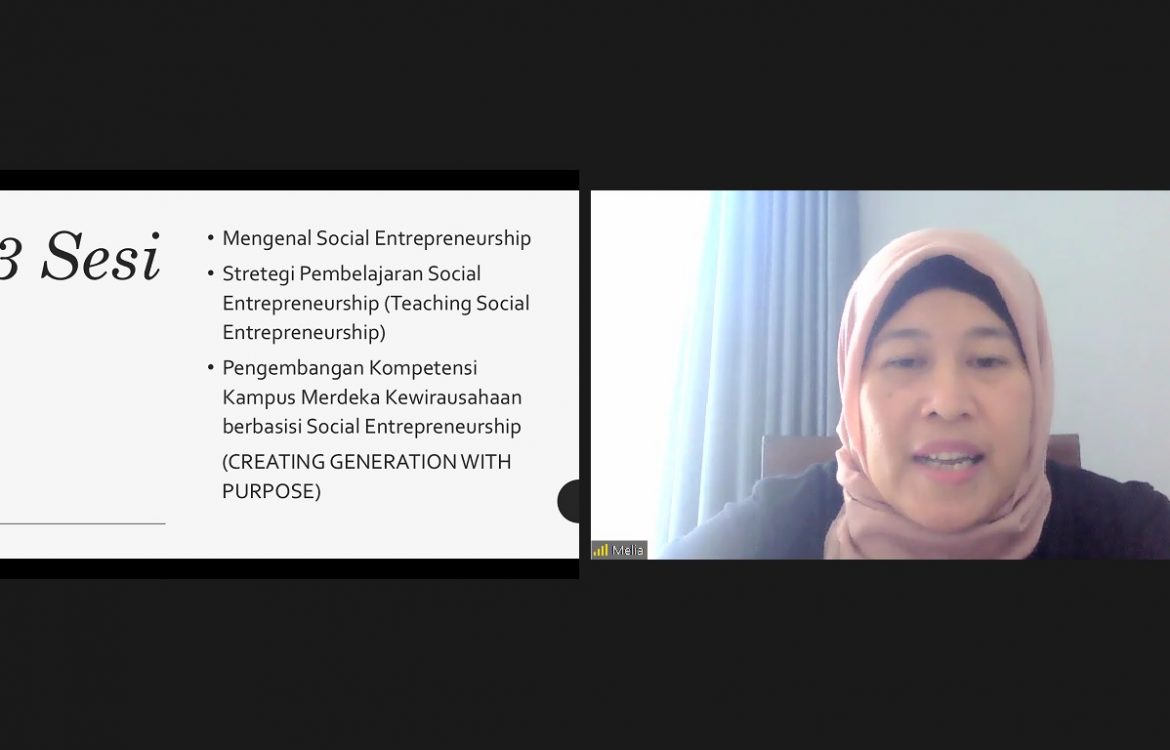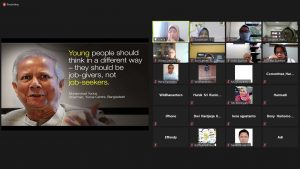
Entrepreneurship is Powerful in the Academic and Non-Academic Activities
The Management Study Program, Faculty of Economics and Business (FEB) Universitas Sebelas Maret (UNS) held a Technical Assistance for the Kampus Merdeka-Entrepreneurship Program: Social Entrepreneurship, Tuesday, August 3, 2021. The activity that was attended by lecturers and students from various study programs invites Melia Famiola, STP, MT, Ph.D., a lecturer from the School of Business and Management ITB.
At the beginning of her presentation, Melia, Ph.D., introduced more details about social entrepreneurs and shared the involved parties’ experiences in this sector. According to her, the issue of social entrepreneurship was initiated with movements carried out by several people. People who choose to be social entrepreneurs must be smart, as it is not easy for them to see the gaps in their social activities in order to create transformation leading to an economic turnaround for the community.
“This is the reason why the current entrepreneurship has become quite powerful in the academic and extracurricular activities. Even the long-established businesses are required to contribute to the achievement of the SDGs, whether in reducing poverty, hunger, addressing health, tackling environmental problems and various other problems around us,” he explained.
 Furthermore, according to Portales, there are four essential elements of a social entrepreneur. In a social entrepreneur, there must be a social mission within a systemic change. In order for the social mission to create systemic change, it must be explored along with social and economic activities. The end goal is how to create a positive impact.
Furthermore, according to Portales, there are four essential elements of a social entrepreneur. In a social entrepreneur, there must be a social mission within a systemic change. In order for the social mission to create systemic change, it must be explored along with social and economic activities. The end goal is how to create a positive impact.
Social entrepreneurship attributes include social motivation, economic intelligence, courage, and quick and alternative thinking. A social entrepreneur is a person who has a social mission, empathy, and particular social interests. Social impact will not happen just by doing charity or charitable activities, but it must be creating transformation on how people can change toward a positive direction as expected. Additionally, what social entrepreneurs have is economic intelligence, the ability to find business opportunities.
Two other characters possessed by social entrepreneurs are bravery, a person who dares to make difficult decisions. A social entrepreneur must be more courageous than those involved in certain businesses because sometimes the social value proposed through their opinion has no economic value, more leaning to charity in nature. However, a social entrepreneur must dare to take the risk and must be creative in looking for economic strategies, have more guts, and be stronger than an ordinary entrepreneur. The second attribute is quick-witted to find alternative ideas. This attribute refers to the condition when a person is dealing with the community, dealing with a lot of people’s behavior, that requires them to adapt to find a strategy on how to make changes.
Further, Dr. Melia said that there are three things required to develop the Kampus Merdeka-Entrepreneurship program in social-based entrepreneurship: mindset transformation, educational ecosystem support in entrepreneurship development, and the new role of the campus as a hope.
Furthermore, the entrepreneurship education ecosystem is built based on three roles, stimulation, support, and sustainability. Stimulation includes entrepreneurship education, motivational training, assistance and guidance in selecting products, project reports preparation, product and process development, entrepreneurial forums creation, and skills recognition.
Supporting includes funding assistance, provision of working space, guidance, legal assistance, and provision of other public facilities. Sustainability can be provided in the form of modernization assistance, additional financing for capacity utilization, product orders, quality testing and services improvement, as well as public facilities based on needs. (Humas FEB)

